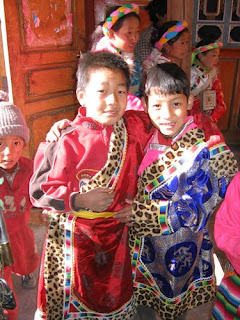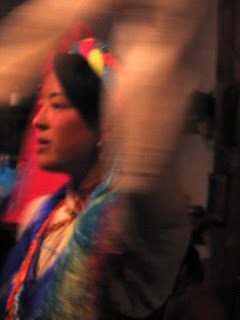 By Mu Qian
By Mu QianFor two days, I lost contact with the modern world. There was neither a telephone line nor signal for a mobile phone in this remote Tibetan village called Sulu.
Located on the border of Southwest China's Yunnan and Sichuan provinces, and only tens of kilometres away from the Tibet Autonomous Region, Sulu is a small village in Deqen County of Yunnan's Diqing (Dechen) Tibetan Autonomous Prefecture.
Setting out from Shangri-la, capital of Diqing, we had driven for the better part of a day along the zigzag dirt road by the Jinsha River (the upper reaches of the Yangtze River) before we arrived here.
Among my companions were Wenzi, a 54-year-old man from Chengdu who had a hobby of shooting films of traditional folk music and dance, Haitao, a freelance writer from Inner Mongolia who was writing a book about Diqing, and Li Yao, a Shangri-la-based photographer whose works have been inspired by the beautiful scenery of northwest Yunnan.
When we got to Sulu, a group of Tibetan villagers welcomed us with qingke (a kind of highland barley) wine, hada (long pieces of silver white silk), and songs.
In this quiet village, there are only 25 households. We were lodged in the home of 53-year-old Nyanyung, who was the uncle of a friend of Li.

It was a typical Tibetan house in this dry-hot river valley area. The ground floor was used as shed for livestock. We came in and out from the second storey, a big drawing room. And the third storey consisted of bedrooms.
"It cost us 20,000 yuan to 30,000 yuan (US$2,466 to US$3,700) to build this house," said Nyanyung's second son, 23-year-old Sinatashi. "Here we needn't hire people to do the construction work, everybody in the village came to help. We only need to feed them with meat and drinks."
Sinatashi was sitting beside a stove, in which wood was being burnt to warm the drawing room. On the wall behind him, three pictures were hung beside each other: Panchen Lama, Bodhisattva and Mao Zedong.
Three years ago, to get to Shangri-la, Sinatashi had to cross the Jinsha River and climb a mountain to go to Derong County in Sichuan Province, where he could catch a long-distance bus. Before then when he went to his junior middle school in Deqen, he had to travel for three days over the mountains in a caravan.
Communications have much improved now, but strangers are still rare in this area. We were welcomed as a group of special guests in Sulu.

Most villagers had gathered in Nyanyung's drawing room for a welcoming party. We were treated to meat and drinks too, such as the delicious yak butter tea, and qingke wine.
And even more touching, we were treated to performances of singing and dancing. I was originally afraid of becoming drunk on the qingke wine, but what was really intoxicating was the folk singing and dancing.
The villagers formed a circle, and began to perform xianzi (or "ye"), a kind of song and dance performance popular among the Tibetans living in Yunnan and Sichuan provinces.
No matter what age or gender, they held each other's hands, except those playing piwang (a Tibetan fiddle) to accompany the performance.
The circle was apparently divided into two teams, which sung a verse each in competition with the other team. When the singing party changed, the whole circle changed its direction of dancing movements. Towards the end of each song, the tempo became faster and faster, until it was impossible to go any quicker.
Sulu village is governed by Yangla Township, which is particularly famous for its xianzi. And our host Nyanyung used to be nicknamed "King of Xianzi" in the area. That means he not only played the piwang well, but sang and danced well too.

"I started to play xianzi at the age of 8, and now I know over 100 tunes," said Nyanyung. "Being a Tibetan, you learn it naturally without having to study."
The form of xianzi seemed to be quite simple, but later I found that its simple form actually conceived of numerous variations. It was not like art that can be appreciated from afar, but more a physical thing whose power can only be understood by getting involved.
So naturally I joined in too, but I am not a Tibetan, and xianzi didn't come to me naturally. Every time I mastered the villagers' steps, they changed to another kind of dance step right away. Sweat was probably my greatest gain, and I found that dancing xianzi was by no means easier than in a nightclub.
Sinatashi told me that villagers often gather to play xianzi at festivals, weddings, or after harvest. Every autumn, after reaping crops, farmers would take a rest for about seven days. And while the cows and sheep would graze freely in the fields, they would gather in a communal house to play xianzi.
 Sometimes they start after midnight, and play till sunrise. Sinatashi said his grandma, 85 years old now, often watched fellow villagers sing and dance throughout the night.
Sometimes they start after midnight, and play till sunrise. Sinatashi said his grandma, 85 years old now, often watched fellow villagers sing and dance throughout the night.Afraid that we might feel tired, the villagers did not dance throughout that night and finished our first night's xianzi by 1 am. I did feel tired after the day's traveling and dancing, and fell asleep quickly to the rhythmic snores of my six roommates.
The next morning, I heard a kind of bell when I was still dreaming. To me, it sounded very spiritual. I opened my eyes and found it continued.
As I got up and went into the courtyard, I saw Nyanyung's first daughter-in-law feeding grass to the cows. When the cows ate grass, the cowbells on the their necks began to ring.
I had heard the sound of a cowbell in a concert back in Beijing. Its distinctive sound had attracted my attention when a musician played it to create a special effect. But the cowbells sounded by the moving cows created a more intriguing natural harmony.
 In this quiet environment, I seemed to have become more sensitive to sounds. Instead of listening to the ringing of my mobile phone, I listened to the sound of the wind, of leaves falling to the ground, and of the twittering of birds.
In this quiet environment, I seemed to have become more sensitive to sounds. Instead of listening to the ringing of my mobile phone, I listened to the sound of the wind, of leaves falling to the ground, and of the twittering of birds.I also noticed another kind of sound in Sulu—children reciting textbooks, which came from a house higher up on the mountain. It was the village's primary school. All 10 students at the school were reciting their texts.
Forty-eight-year-old Drolma was the school's only teacher, and taught all subjects, but students above the third grade had to go to another village to finish their primary education.
Sinatashi, who graduated from the Ethnic Normal School of Diqing Prefecture, was one of the few people in the village to complete a secondary school education. However, having failed the interviews to become a teacher and a civil servant, he couldn't find a job and remained at home farming.
"Could you tell me what I should do?" he asked. "In this isolated place no one could tell me."
 Unlike his two brothers who were satisfied with their lives supported materially by farming and spiritually by playing xianzi, Sinatashi longed for more in his life.
Unlike his two brothers who were satisfied with their lives supported materially by farming and spiritually by playing xianzi, Sinatashi longed for more in his life.I couldn't give him an answer, except that I encouraged him to explore the outside world more if he had the opportunity, but never to lose his own identity.
In the evening, Wenzi played the video he shot of last night's party. It was a happy moment for all the villagers who came to watch it on Nyanyung's TV. Every detail, every expression of someone they knew would instigate raucous laughter.
For the villagers here, who watched TV for the first time only about four or five years ago, seeing themselves on the TV must have been extremely exciting.
Then another night of xianzi began. Knowing that we were leaving the next morning, both villagers and ourselves gave our all. Nyanyung, with his dazzling steps, demonstrated to us that he was still "King of Xianzi".
 "The prairie is covered with flowers in spring. The time for the flowers won't be too long, but we will see each other next spring.
"The prairie is covered with flowers in spring. The time for the flowers won't be too long, but we will see each other next spring.The fields are covered with crops in summer. The time for the crops won't be too long, but we will see each other next summer.
The river is covered with ice in winter. The time of ice won't be too long, but we will see each other next winter."
(Time of traveling: December 2005)





 On my way back to the hotel, I found out about the reason of the fire the night before. The locals were burning straws to obtain alkali, to be used in the making of zongzi, a pyramid-shaped dumpling made of glutinous rice wrapped in bamboo leaves.
On my way back to the hotel, I found out about the reason of the fire the night before. The locals were burning straws to obtain alkali, to be used in the making of zongzi, a pyramid-shaped dumpling made of glutinous rice wrapped in bamboo leaves. Several people invited me to eat zongzi with them the next day, but I had to leave Zhaoxing in the afternoon. I wish I could stay.
Several people invited me to eat zongzi with them the next day, but I had to leave Zhaoxing in the afternoon. I wish I could stay.